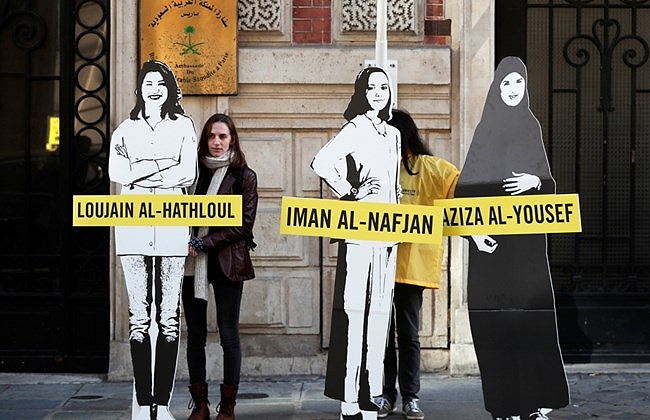RIYADH: A Saudi court hearing in the high-profile trial of detained women activists ended yesterday without bail for eight of them, campaigners said, following the provisional release of three remaining detainees last week. Eleven women, some of whom allegedly faced torture and sexual abuse during nearly a year in detention, are on trial in Riyadh's criminal court on charges that include contact with foreign media, diplomats and human rights groups.
Three of them - blogger Eman Al-Nafjan, retired university lecturer Aziza Al-Youssef and preacher Rokaya Al-Mohareb - were seen hugging one another as they entered the courthouse after being granted temporary release last Thursday. The others were subsequently expected to be freed, but there was no decision from the three-judge panel on Wednesday.
"The third trial session for the Saudi women activists has ended with NO VERDICTS against any of them, and with no temporary release to any of them," Prisoners of Conscience, a Saudi group that tracks political prisoners, said on Twitter. It added that the next hearing in the trial, which foreign media and diplomats are barred from attending, was scheduled for April 17.
There was no immediate comment from the court, but the development was corroborated by multiple other activists and people with access to the trial. Most of the activists were detained last summer in a wide-ranging crackdown against women campaigners just before the historic lifting of a decades-long ban on female motorists.
The siblings of one of the prominent detainees, activist Loujain Al-Hathloul, said they were being pressured by people close to the Saudi state to remain silent over her treatment in detention. "Pressure from all sides to remain silent," her sister Alia Al-Hathloul said on Twitter, without naming anyone. "We were silent and the worst kinds of torture happened while we were silent. I can shut up but only when Loujain is with us and those who tortured her are put on trial."
At an emotionally charged hearing last week, some women broke down as they accused interrogators of subjecting them to electric shocks, flogging and groping in detention, two people with access to the trial told AFP. The Saudi government denies the women were tortured or harassed.
'Buckling to pressure'
The women were initially expected to appear in a court set up to handle terrorism-related cases, but trial was shifted to the criminal court at the last minute, without any explanation. That prompted speculation the trial could pave the way for the women's release. Some detainees, including Loujain, were recently made to sign letters in prison requesting a royal pardon from King Salman.
But people close to the Saudi establishment have warned that public criticism by family members could prolong their detention. "One of the issues I believe Saudi is grappling with… is not to be seen to be buckling to Western pressure," Ali Shihabi, founder of pro-Saudi think tank Arabia Foundation, said on Twitter last week. "(It) can only delay their release."
Before their provisional release, the three freed women and their bail guarantors were made to sign a pledge that they will stay away from the media, according to multiple people with access to the trial. At the time of their arrest, officials accused the women of links to foreign intelligence agencies, while state-backed media branded them traitors and "agents of embassies".
The charge sheets, however, make no mention of contact with foreign spies, campaigners who have reviewed the documents say. The trial has intensified criticism of the kingdom over human rights following global outrage over journalist Jamal Khashoggi's murder by Saudi agents last October at the kingdom's consulate in Istanbul. - AFP











